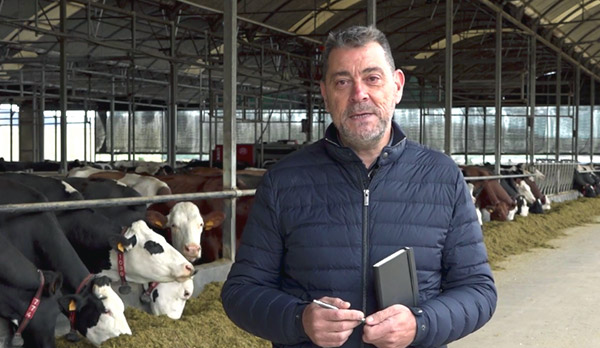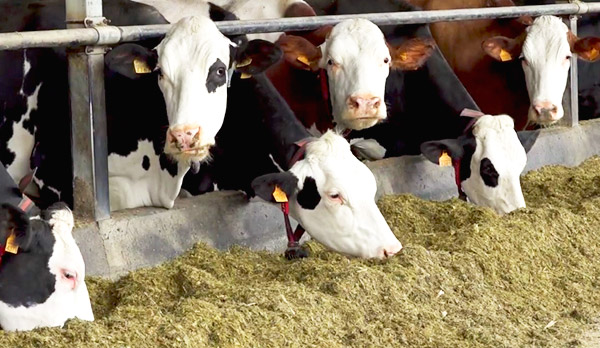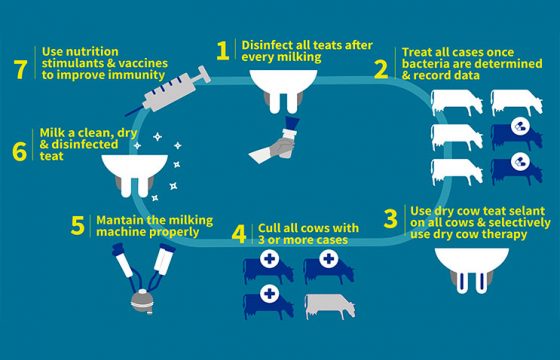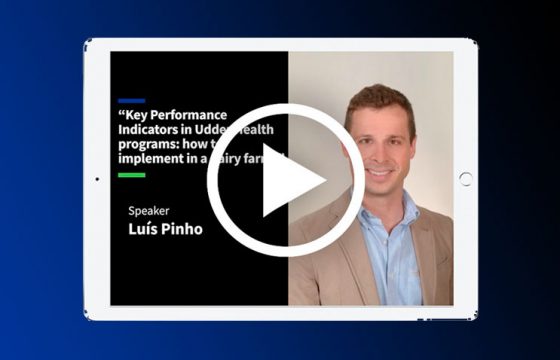A mastitis Experience from Latin America to Spain
Today we are speaking with Antonio Souto, who since 2021 has been running a new Mastitis Technical Service at HIPRA with the aim of advising professionals in the dairy industry on the importance and prevention of this pathology to achieve better results and improved animal well-being.
Interview with Antonio Souto

Watch the Interview (Spanish language): Vacapinta.com
“A vaccination programme reduces the incidence and severity of mastitis. And decreases the use of antibiotics.”
1- Antonio, tell us a bit about your career until now:
I started my career back in the 90s, forming a veterinary group with two colleagues to provide services to farms in the province of A Coruña.
After 20 years in the field, in 2011, I went to work at HIPRA laboratories as a technician at the Ruminant Unit in northern Spain.
In 2015, I moved to Mexico to perform technical services tasks in that country, together with Colombia and Costa Rica. In 2017, I took over the coordination of technical and marketing services as regional head for all of Latin America, from Mexico to Brazil.
An important part of my work there was milk quality and the development of mastitis vaccination.
2- We can see that you have a broad international track record, with experience in many Latin American countries. What did you find there? What were your impressions?
The first impression is the sheer size of these countries and their diversity.
Mexico alone is a big as Spain, Ireland, the United Kingdom, Germany, France, Belgium, Holland and Denmark all together. Half of Europe!
And Brazil is equivalent to 17 Spains. You can imagine the vastness of that continent and the amount of cattle it could hold.
In addition, we find countries that are true giants in milk production: Brazil produces 34 million tons, it is the fourth largest milk producing country in the world.
3- Do you have any memory or story that particularly caught your attention during your stay in Latin America?
I remember one of my first visits to Peru, to a farm with serious E. coli / mastitis problems. Over there, many of them are literally on the beach.
That was the case with this farm, where I was shocked because the beds were made of manure and weren’t changed for months. The origin of the mastitis was clear.
So as an initial measure, I recommended eliminating the manure beds and changing them for sand beds, a material that they had in abundance and free on their doorstep.
Taking pity on me, the manager told me: “Doctor, the guano, the manure as you call it, is our second source of income after milk.” And he explained that guano is sold to agro-industrial companies as fertiliser for their crops of asparagus, blueberries, etc.
Indeed, many of these companies set up dairy farms with the primary purpose of using manure and lowering fertiliser costs.
“Often we need to change our mentality and adapt to the reality of each farm. There is no perfect, universal formula for preventing mastitis. ”

4- How is the mastitis situation and the quality of milk there?
It’s really diverse, both between countries and within each country.
Costa Rica stands out, with a pioneering milk quality programme, with parameters similar to those in Europe. They are highly motivated to improve regarding mastitis.
Mastitis prevention programmes have also been implemented in Mexico, Brazil, Chile and Argentina for years. But there are also many countries that still have a long way to go to make their farms more profitable and improve their quality.
5- And does vaccination form part of the milk quality programmes?
Of course; nowadays, tools and knowledge in the field of mastitis prevention are universal.
To give you an illustrative example, in the Brazilian Milkpoint portal, which produces an annual ranking of the country’s best dairy farms, half of the top 100 are using a milk quality programme that includes vaccination with STARTVAC®. And they are the best farms in the country.
6- Let’s move a little closer to home… What similarities do you see in the trends you saw there and the Spanish ones?
“It is clear that milk production is based on efficiency and profitability, and on offering the consumer the best product with sustainable, environmentally friendly production. And mastitis is the number one enemy of those objectives.”
Over there, the technified farms are like the Spanish ones, where prevention already plays a fundamental role.
Work is being carried out on quality programmes, reducing the use of antibiotics and promoting the image of milk as a high-quality basic product.
7- Seeing this parallelism and similarities between countries, do you think it would be possible to include vaccination within a standard milk quality programme?
Of course. In fact, many farms around the world are already doing so.
Mastitis vaccines are preventive tools that allow us to work with peace of mind, improve productivity, and earn more money, which is what it’s all about.
Using vaccines is not an expense, but an investment. A clear Return on Investment has been shown when we use them correctly.
A vaccination programme reduces the incidence and severity of mastitis. And decreases the use of antibiotics.
“The 20th century was the century of antibiotics. The 21st century will be that of vaccines.”



2 Comments
I learned nothing about the vaccine, the dose to use, how often, how and when to administer, what the vaccine is specificly against, cost and when should farmer use it
Hi Richard,
thanks for your comment! please keep in mind that the information you are asking for can be found in the manufacturer webside, hipra.com.
Regards,
Comments are closed.